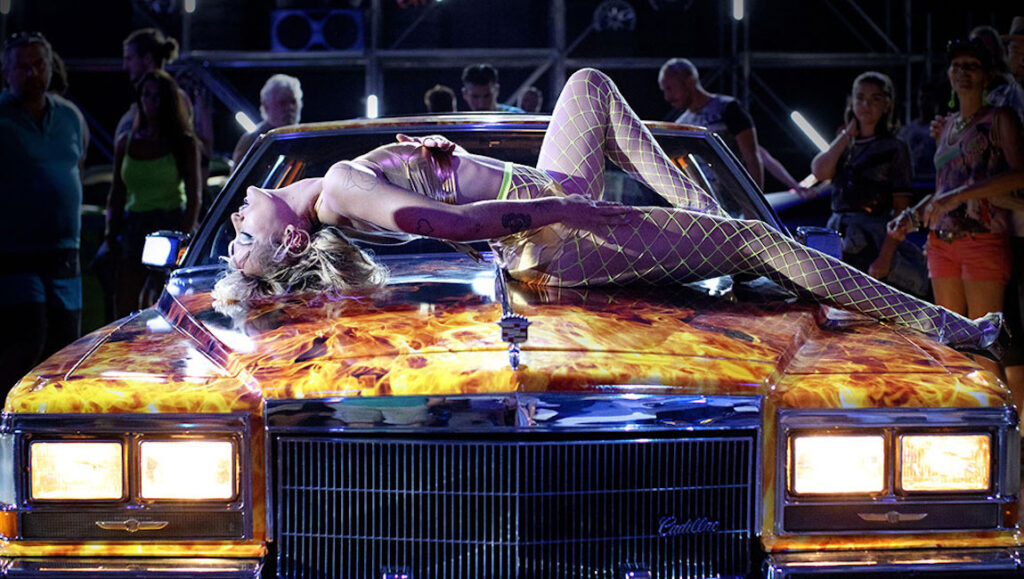Titane admirably reconciles opposites and piles on texture and sensation, but ultimately reveals itself far too content to trade only in cliché.
What is the role of “transgressive” art in an ostensibly liberal society? Or, to put it another way: In a cultural context where the top prize of the world’s most prestigious film festival can go to a movie where a woman fucks a car — twice — and where no image, however outré, seems incapable of being assimilated into the dominant lines of discourse, what is the place of personal belief and aesthetic conviction? How is one to approach a film like Julia Ducournau’s Palme d’Or–winner Titane?
Despite a prologue that links a young girl’s traumatic auto accident to sexual compulsion, however, it should be said up front that Titane is not ultimately concerned with fetishistic obsession — which means that it only superficially resembles David Cronenberg’s Crash (1996). Its signal motif has to do not with desire (at least not primarily), but modification: how one should respond to the overlapping forces that seem to bear upon one’s very flesh, how one should assimilate (or reject) the various demands that eventually come to feel like unwanted but unignorable foreign bodies. Ducournau’s savvy script foregrounds this clearly. Years after that initial crash, Alexia (Agathe Rousselle) dances nightly at an auto-themed club, displays conspicuous interest in the various “modifications” of her sexual partners (particularly the nipple-piercing of a would-be girlfriend), and also casually murders them with an iron hair-pick. After a particularly conspicuous set of killings that force her to go on the run, she tries to disguise herself as a long-lost missing person: a young man who turns out to be the son of Vincent (Vincent Lindon), a roided-up fire chief attempting to stave off the realities of his ever-advancing age.
The relationship that eventually develops between the two — which cuts meaningfully across lines of gender, sexuality, and normative societal expectation — is comprehensible to no one but themselves, and it’s not meant to be, Ducournau being more interested in heavy pile-ups of texture and sensation over any sort of causal logic or narrative coherence. But all the same, this folie à deux becomes the clear center of Titane, the locus of the film’s sundry oppositions: masculinity/femininity, man/machine, blood/oil, flesh/metal, and the like. Entirely unafraid of cliché, Ducournau takes each of these paired fixations to their extremes, all while pushing Titane to a climactic point of reconciliation, effectively fusing the film’s disjunctive moving parts into the image of a small, cyborg infant (the product of Alexia’s unexplained, apparently immaculate conception). And just as the automobile is in cinema a metonym for various histories and discourses of gender, sexuality, violence, and desire (a lineage that Ducournau is only too familiar with), so this part-mechanical Messiah becomes a veritable symbol of the film itself — a symbol, perhaps, of the future.
But this is where Titane seems to break down — or anyway lays bare its limitations. For while there is something admirable about Ducournau’s brash attempt to reconcile opposites, the value of doing so is no higher than the perceptiveness of the diagnosis and description of the paired poles — and Ducournau reveals herself to be, in the end, content to trade only on cliché. Structurally, Titane depends on pitting two obviously unappealing extremes against each other while sliding toward a final, implosive synthesis. So however well-engineered, its supposed shock cannot go beyond the assumed terms of the dialectic. The question we started with, then, is perhaps something a false conundrum — for it assumes transgression on the moral rather than the imaginative level. But what we find, watching films such as Titane, is that anything genuinely transgressive tests not instincts of the censor, but the very bounds of the conceivable. And however skillfully Titane may be said to short-circuit the former, it does not, ultimately, challenge the latter. It is a failure of imagination — which means that it is, in a crucial sense, really no challenge at all.
Published as part of Toronto International Film Festival 2021 — Dispatch 2.


Comments are closed.